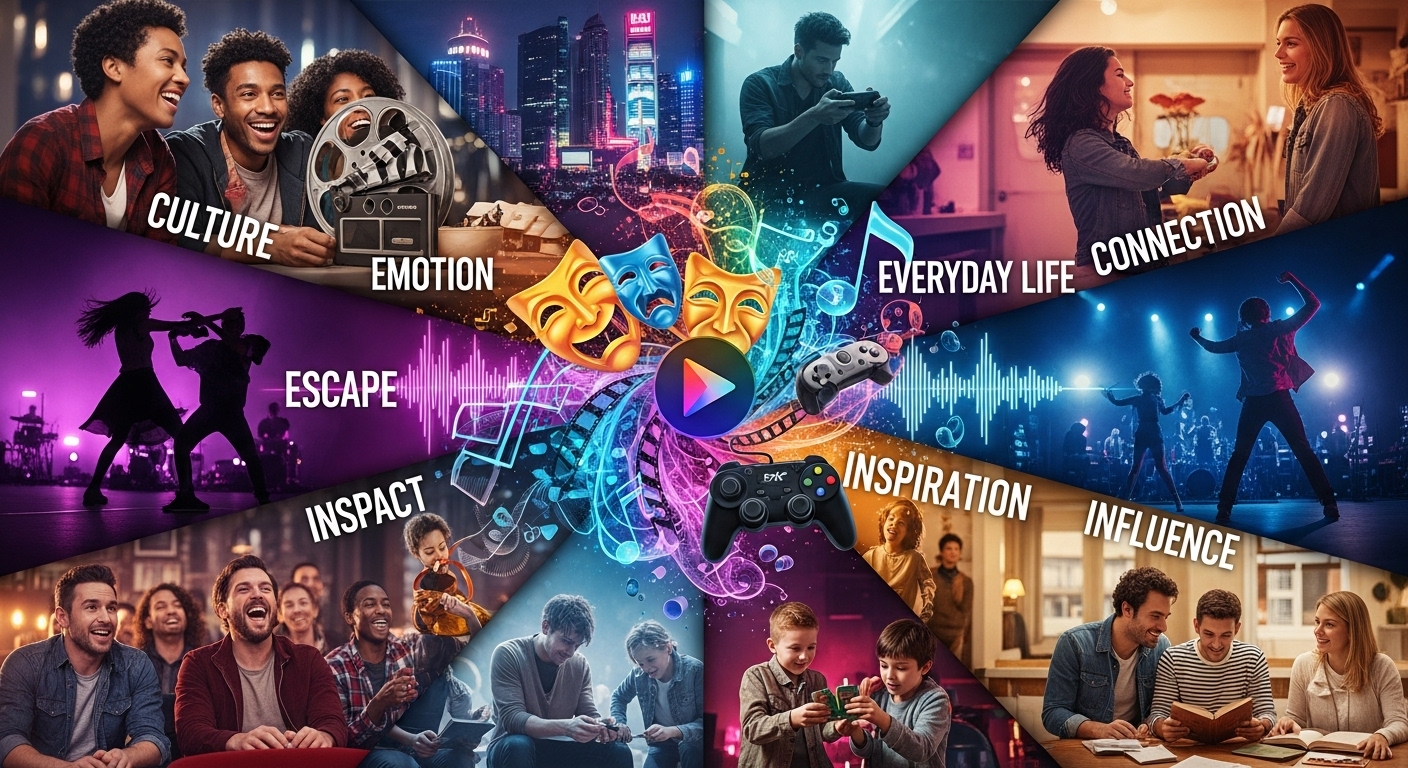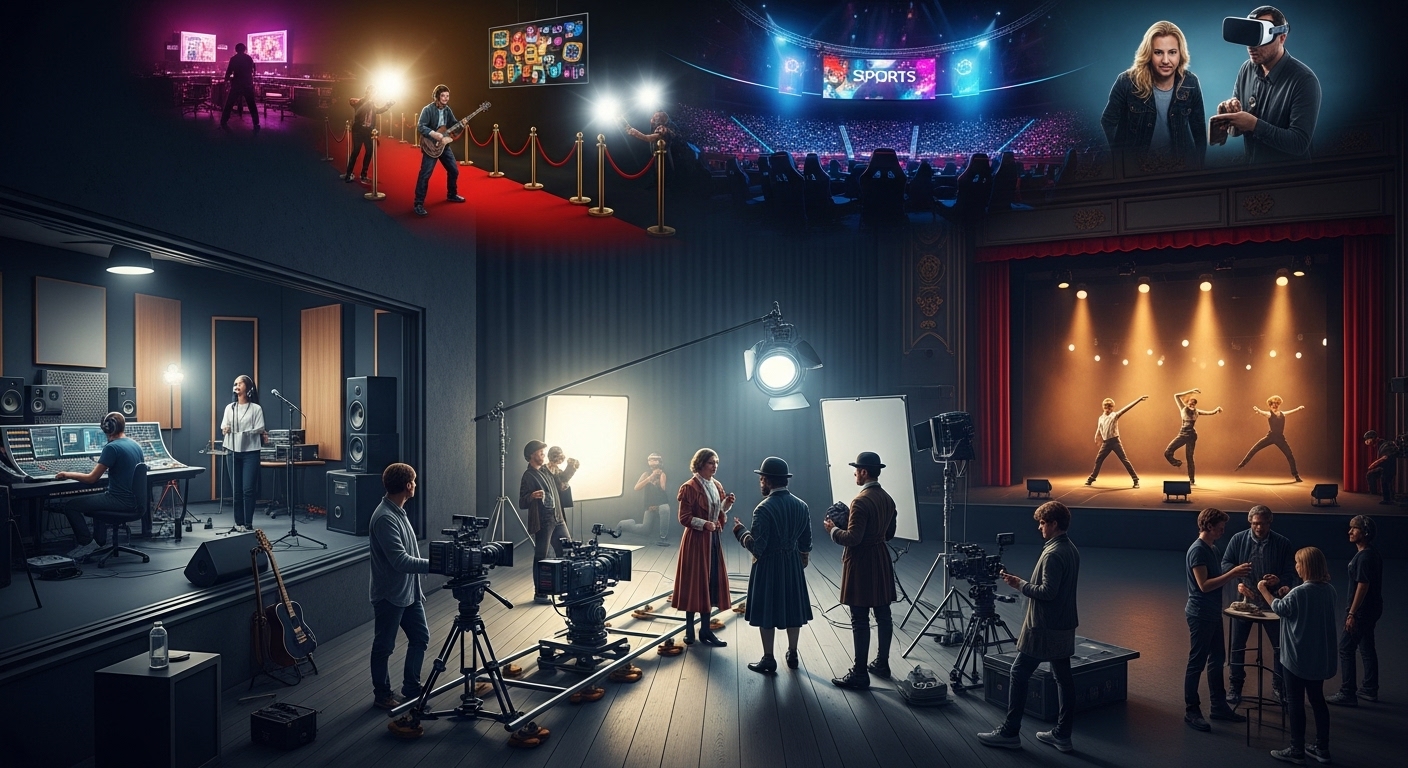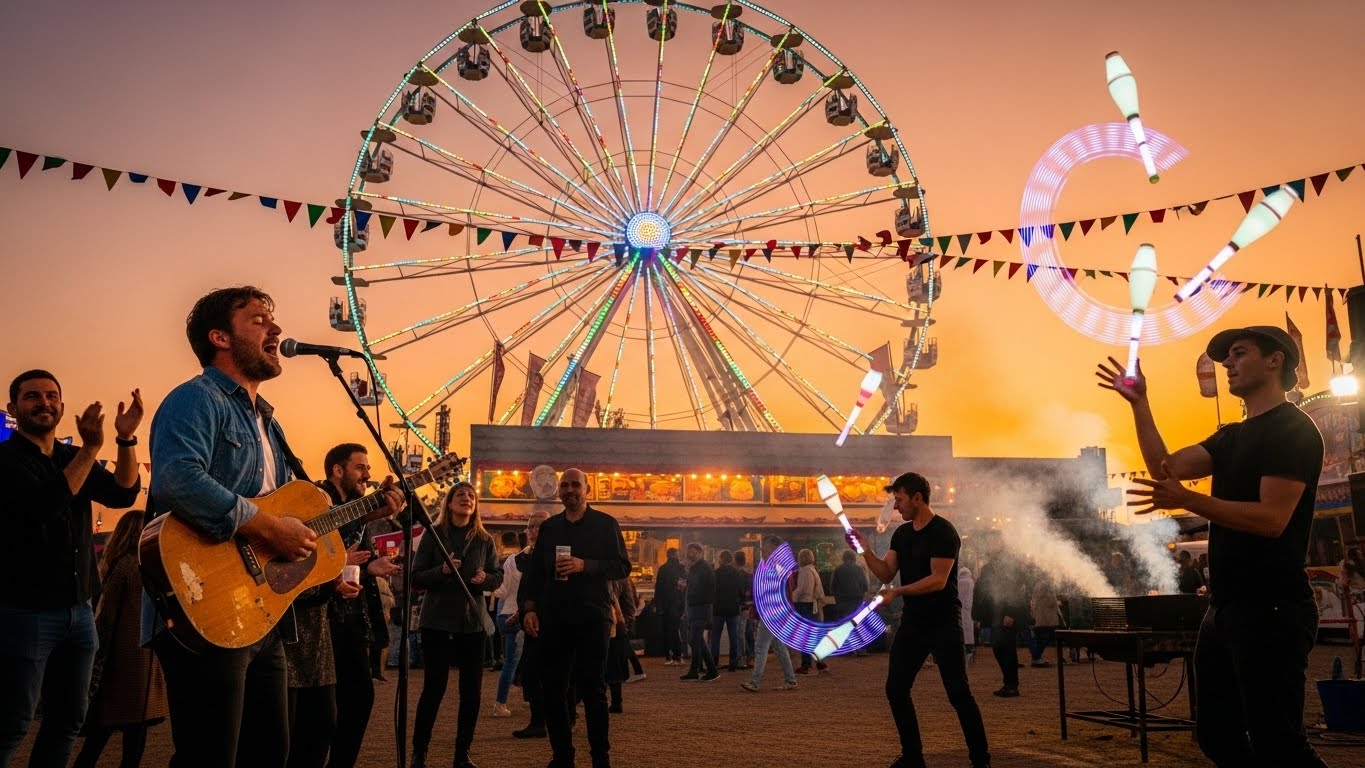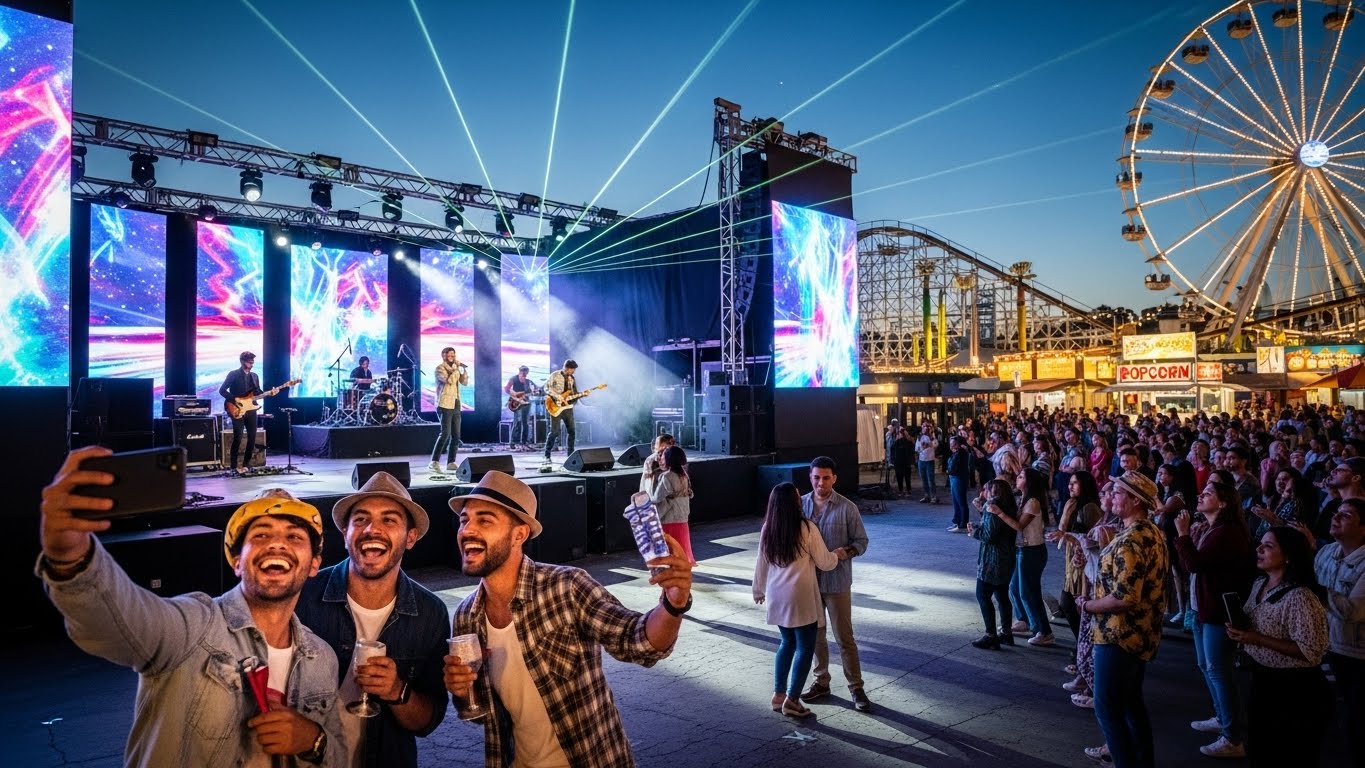The Power of Entertainment: How It Shapes Culture, Emotion, and Everyday Life

Introduction
Entertainment is one of the most powerful forces in human life. It has the ability to make people laugh, cry, think, and dream. From the earliest storytelling traditions to modern movies, music, gaming, and streaming, entertainment has continuously evolved to reflect the spirit of its time. It offers not only joy and relaxation but also a mirror of society, expressing its values, struggles, and ambitions.
In today’s world, entertainment has become more than a pastime—it’s a cultural necessity. It shapes identity, influences public opinion, and connects people across the globe. Whether through film, theater, video games, music, or digital platforms, entertainment defines how we experience art, technology, and each other.
This blog explores the many dimensions of entertainment—its history, evolution, emotional impact, and role in modern life. It examines how entertainment influences individuals, communities, and even worldviews, making it one of the most vital aspects of the human experience.
The Origins of Entertainment
The roots of entertainment stretch back thousands of years. Long before the invention of television or film, humans found joy in storytelling, dance, and performance. Ancient civilizations celebrated music, theater, and sports as communal activities that brought people together.
In ancient Greece, theater was not only a source of amusement but also a means of exploring moral and political ideas. In medieval Europe, traveling performers and minstrels entertained crowds with tales of heroism and adventure. Across Africa and Asia, music and oral storytelling preserved traditions and educated future generations.
These early forms of entertainment served as both education and escape. They reflected the human desire to connect, express creativity, and find meaning in shared experience. Over time, entertainment became a defining element of culture, evolving with technology and society itself.
The Golden Age of Cinema
The twentieth century introduced one of the most transformative forms of entertainment—the motion picture. When silent films first appeared, they captured imaginations like never before. The magic of moving images created an entirely new art form that combined storytelling, acting, and visual innovation.
The Golden Age of Hollywood during the 1930s to 1950s produced some of the most iconic stars and films in history. Actors like Humphrey Bogart, Marilyn Monroe, and Audrey Hepburn became household names, and studios turned filmmaking into a global industry. Cinema became a universal language, capable of communicating emotion and storytelling across cultures.
Movies provided escape during difficult times, such as wars and economic depressions. They offered hope, laughter, and adventure. Even today, the influence of classic cinema can be seen in modern storytelling, with many filmmakers drawing inspiration from this legendary era.
The Evolution of Television
Television revolutionized entertainment once again by bringing stories directly into people’s homes. From live broadcasts and news to sitcoms and drama series, television quickly became the center of family life.
The 1950s marked the rise of iconic programs that defined the era’s culture and values. As decades passed, television expanded its reach with cable, satellite, and eventually digital platforms. Each generation experienced its own wave of unforgettable shows—from classic sitcoms and game shows to groundbreaking dramas and reality television.
Television not only entertained but also shaped public conversation. It brought global events into living rooms and allowed viewers to witness history in real time. Today, streaming services have transformed television into an on-demand experience, giving audiences endless choices and control over what they watch.
Music: The Soundtrack of Life
Music is perhaps the most emotional and universal form of entertainment. It has the power to move people deeply, transcending language and culture. A song can evoke nostalgia, joy, sadness, or inspiration in seconds.
Throughout history, music has evolved alongside technology. From classical symphonies to jazz, rock, pop, and hip-hop, every genre has captured the spirit of its time. The 1960s brought revolutionary artists like The Beatles and Bob Dylan, whose songs reflected social change and personal freedom. Later decades saw the rise of disco, electronic, and rap, each shaping youth identity and cultural trends.
In today’s world, streaming platforms and social media allow artists to reach audiences instantly. Independent musicians can build global fan bases without major labels. Music videos, live performances, and collaborations create immersive experiences that keep audiences connected.
Music continues to serve as both expression and escape, offering comfort in hard times and celebration in good ones. Its universality ensures it will always be at the heart of entertainment.
Theater and Live Performance
Before screens dominated entertainment, theater was the pinnacle of performance art. From Shakespearean plays to modern musicals, theater has remained one of the purest forms of storytelling. It connects audiences and performers in real time, creating a shared emotional experience.
Musical theater, in particular, combines acting, dance, and music to create powerful emotional moments. Productions such as Les Misérables, The Phantom of the Opera, and Hamilton have captivated audiences worldwide, proving that live entertainment continues to thrive in a digital age.
Live performance also extends beyond theater to concerts, comedy shows, and dance recitals. These events remind people of the magic of presence—the energy, emotion, and unpredictability that only live art can deliver. In a world increasingly dominated by screens, live entertainment remains a cherished experience that reminds audiences of the human connection behind creativity.
The Rise of Video Games
Video games represent one of the most influential and fastest-growing forms of entertainment. What began as simple arcade machines in the 1970s has become a multi-billion-dollar global industry that combines storytelling, technology, and artistry.
Modern games are far more than playful distractions—they are immersive worlds that rival films in narrative depth and visual design. Players are no longer passive observers but active participants in the story. From vast open worlds to competitive esports tournaments, gaming offers something for everyone.
The emotional and social impact of gaming is profound. Players form friendships, learn strategy, and develop creativity. Story-driven games explore themes like morality, identity, and loss, proving that games can be as emotionally powerful as any other art form.
With advancements in virtual reality and augmented reality, gaming continues to redefine the boundaries of entertainment, offering interactive experiences that blend fantasy and reality in ways once thought impossible.
Streaming and the Digital Revolution
The digital age has transformed entertainment consumption completely. Streaming services have replaced physical media and broadcast schedules, allowing viewers to watch anything, anytime, anywhere. Platforms host a vast range of content—from blockbuster films and documentaries to live concerts and independent series.
This accessibility has changed viewing habits dramatically. Binge-watching entire seasons, discovering international films, and following global music trends have become part of everyday life. Audiences are no longer limited by geography or television schedules.
For creators, streaming has opened new opportunities. Independent filmmakers, musicians, and performers can reach audiences without relying on traditional studios. The internet has democratized entertainment, empowering creativity and diversity.
The digital revolution also connects fans directly with their favorite artists and actors. Social media interactions, live chats, and behind-the-scenes content make entertainment more personal and engaging than ever before.
The Role of Entertainment in Mental Health
Entertainment is not just a distraction; it plays a vital role in emotional and mental well-being. Movies, music, books, and games offer an escape from stress and anxiety, providing a way to recharge emotionally.
Comedy shows and lighthearted films help people cope with difficult times through laughter. Inspirational stories in cinema or literature can restore hope and motivation. Music therapy is used in medical settings to reduce stress, improve mood, and promote healing.
During global crises, entertainment often becomes a unifying source of comfort. People turn to familiar shows, nostalgic songs, and online communities to find joy and connection. This emotional support highlights entertainment’s profound impact on human resilience.
Celebrity Culture and the Power of Influence
Celebrities have always been central to entertainment, but their influence has grown stronger in the digital age. Actors, musicians, and influencers reach millions through social media, shaping fashion, language, and even social movements.
While celebrity culture can sometimes promote superficiality, it also has the potential to inspire. Many entertainers use their platforms to raise awareness about social issues, encourage charitable action, and promote positive change.
Fans often find motivation in the personal stories of their favorite stars—how they overcame obstacles, embraced individuality, and pursued their dreams. This connection between celebrity and audience blurs the line between art and real life, turning entertainers into role models for generations.
The Business of Entertainment
Entertainment is not just art—it’s a global industry that fuels economies. Film studios, record labels, concert organizers, and streaming companies create millions of jobs worldwide. From actors and directors to technicians, designers, and marketers, the entertainment sector supports a vast network of professionals.
Advertising and brand partnerships have also become key elements of entertainment. Product placements in films, sponsored music videos, and influencer collaborations generate significant revenue. Sports and entertainment often merge, as events like the Super Bowl or music festivals combine multiple industries into single cultural phenomena.
The success of entertainment as a business lies in its adaptability. As technology evolves, so does the industry—embracing new platforms, formats, and audiences. The blend of creativity and commerce ensures that entertainment remains one of the most dynamic sectors in the world.
The Cultural Impact of Entertainment
Entertainment doesn’t just reflect culture—it shapes it. Films, music, and television often introduce new ideas, challenge traditions, and inspire social change. A movie can shift public perception; a song can become the anthem of a generation.
Cultural trends often emerge from entertainment. Fashion, slang, political awareness, and even global movements have been influenced by what people watch, listen to, and play. Entertainment acts as a lens through which society views itself, constantly evolving with the times.
Moreover, entertainment serves as a bridge between cultures. International movies, global music collaborations, and cross-cultural festivals bring people together, promoting understanding and appreciation of diversity. It reminds us that creativity and emotion are universal languages shared by all.
The Future of Entertainment
As technology continues to advance, the future of entertainment promises to be more interactive, immersive, and inclusive. Virtual reality and artificial intelligence are redefining storytelling, allowing audiences to step inside narratives and shape outcomes.
Personalized entertainment experiences are becoming the norm. Algorithms predict what viewers or listeners will enjoy, while fans can engage directly with creators through interactive content and live virtual events.
Inclusivity and representation will also play a major role in shaping the future. Audiences now demand diversity in stories, characters, and perspectives. The entertainment industry is gradually embracing this shift, realizing that authenticity resonates more than ever before.
Despite rapid technological change, one thing will remain constant: the human desire for stories. Whether told through film, song, or digital experience, entertainment will continue to reflect our deepest emotions and highest aspirations.
Conclusion
Entertainment is far more than leisure—it is an essential part of what makes us human. It brings joy, comfort, and connection while also challenging our thinking and expanding our imagination. From the first tales told around fires to the latest digital marvels, entertainment has always evolved alongside humanity, shaping and reflecting who we are.
It has the power to unite people across boundaries, inspire creativity, and provide hope in difficult times. It nurtures both individuality and community, reminding us that despite our differences, we all share a love for stories, rhythm, laughter, and art.
As we move into the future, the role of entertainment will continue to grow. It will merge with technology, adapt to cultural shifts, and reach audiences in ways we cannot yet imagine. But its essence will remain the same—to move us, to connect us, and to remind us of the beauty of imagination and the strength of shared experience.
Entertainment is not just about escape—it is about expression, connection, and the celebration of life itself.



